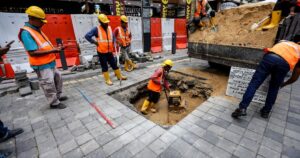JERUSALEM: US mediator Jared Kushner and Israeli Prime Minister Benjamin Netanyahu held talks Monday on the second phase of the Gaza ceasefire, as Washington intensified its efforts to ensure the fragile truce endures.
Prime Minister Benjamin Netanyahu, meanwhile, said Israel would enforce the ceasefire in Gaza as well as one in Lebanon with an “iron fist.”
The truce in Gaza, in effect for exactly a month now, has largely halted the war that erupted after Hamas’s surprise attack on Israel on October 7, 2023.
During the ongoing first stage, a series of prisoner and hostage exchanges took place over recent weeks.
Kushner, the son-in-law of US President Donald Trump who helped broker the ceasefire, met Netanyahu in Jerusalem on Monday as part of US efforts to stabilise the truce and lay the groundwork for its next phase.
The two discussed some of the most sensitive aspects of phase two of the agreement, Israeli government spokeswoman Shosh Bedrosian told journalists.
“Together the two discussed phase one, which we are currently still in, to bring our remaining hostages, and the future of phase two of this plan, which includes the disarming of Hamas, demilitarising Gaza and ensuring Hamas will have no role in the future of Gaza ever again,” Bedrosian said.
“Phase two also includes the establishment of the international stabilisation force and the details of which of course together are being discussed.”
Hamas has repeatedly insisted that relinquishing its weapons is a red line.
– ‘Iron fist’ –
Israel and Hamas continue to accuse each other of violating the ceasefire in Gaza, while Israel has intensified its attacks against Iran-backed Hezbollah in Lebanon despite a truce since November.
Gaza’s health ministry claimed Israeli forces have killed at least 242 Palestinians in the territory since the ceasefire began on October 10.
On Monday, the Israeli military said it killed two fighters who approached the so-called “Yellow Line,” the boundary beyond which Israeli forces hold their positions in Gaza.
Media restrictions in Gaza and difficulties in accessing many areas mean AFP is unable to independently verify details provided by the ministry or the Israeli military.
“Whoever seeks to harm us, we harm them,” Netanyahu said in parliament on Monday.
“We are determined to enforce with an iron fist the ceasefire agreements where they exist against those who seek our destruction, and you can see what happens every day in Lebanon,” he said.
Israel has kept up attacks on Lebanon, where it says it is targeting Hezbollah militants. It agreed a ceasefire to halt a war with the group last November, but has frequently bombed Lebanon since then.
It said on Monday it had killed 15 Hezbollah members since the start of November.
Egypt, Qatar and Turkiye are among the potential participants in the proposed international stabilisation force for Gaza, but the United Arab Emirates has indicated it is unlikely to join without a clear operational framework.
“Under such circumstances, the UAE will probably not participate in such a force,” Emirati presidential adviser Anwar Gargash told the Abu Dhabi Strategic Debate Forum on Monday.
Turkiye has been keen to join, but Netanyahu has repeatedly said Israel would not allow it.
“The prime minister said… there will be no Turkish boots on the ground,” Bedrosian said.
Turkiye has been one of the most outspoken critics of the war in Gaza, and on Friday it issued arrest warrants accusing Netanyahu and several senior Israeli officials of genocide.
– ‘We still do not feel safe’ –
Since the truce began, Hamas has returned all 20 living hostages and the remains of 24 captives, including 21 Israelis.
Four bodies of hostages killed in the October 2023 attack remain in Gaza.
In exchange, Israel has freed nearly 2,000 prisoners and returned 315 bodies of Palestinian captives.
The latest of those were the remains of 15 Palestinians handed over by Israel on Monday after Hamas a day earlier returned the remains of Lieutenant Hadar Goldin, killed in the 2014 Gaza war.
Goldin, killed while attempting to destroy Hamas tunnels near Rafah, had been missing for 11 years.
“Time has stood still,” his sister Ayelet Goldin said in a statement on Monday.
“How do you process fighting for a brother who’s gone? How do you fight for a soldier who went into battle, fighting to bring him home, when in reality he’ll return in a casket? How are you supposed to feel? I still don’t know.”
Despite the progress in hostage returns, Gazans remain anxious about their future.
“We still do not feel safe. Shooting continues … we try to protect our children from psychological trauma and to help them forget the war and its effects,” said Salma Abu Shawish, 40, a resident of Al-Bureij refugee camp in central Gaza.
“Life in Gaza is hard. We still lack food, and many families remain homeless. We only wish this nightmare would stop and never return.”
© New Straits Times Press (M) Bhd






